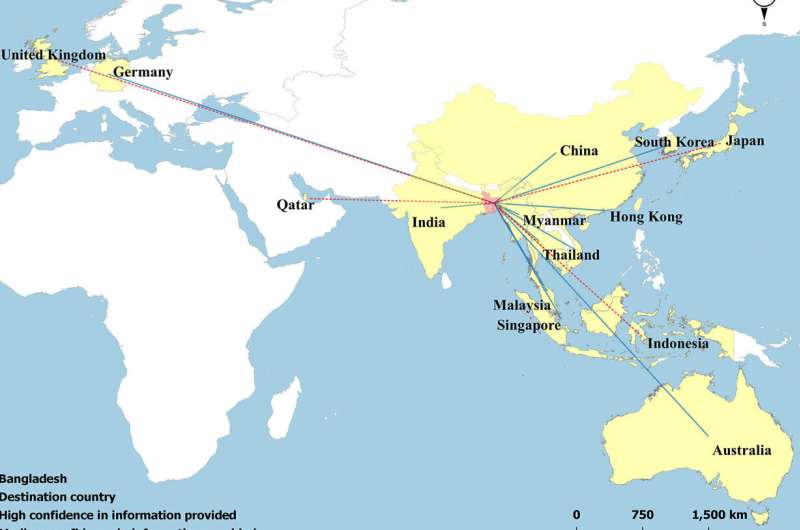Bangladesh major hub for tiger poaching: study

Bangladesh remains a major hub for the poaching of endangered tigers despite government claims of a successful crackdown on pirate groups involved in the trade, according to research published Friday.
The vast Sundarbans mangrove forest straddling India and Bangladesh hosts one of the world’s largest populations of Bengal tigers.
Their pelts, bones and flesh are bought by black marketeers as part of a broader illegal wildlife trade valued at an estimated $20 billion globally each year.
Research from big cat conservation group Panthera and the Chinese Academy of Sciences said tiger parts harvested in the Sundarbans have been exported to 15 countries, with India and China being the most common destinations.
“Bangladesh plays a much more significant role in the illicit tiger trade than we previously realized,” study co-author Rob Pickles said in a statement.
Pirate groups operating in the Sundarbans found a lucrative trade in tiger poaching before a government crackdown starting in 2016.
At least 117 pirates were shot dead and hundreds more were detained, according to official figures, while many others surrendered as part of a government amnesty.
But Panthera’s research, published in the Conservation Science and Practice journal, said that the vacuum created by the crackdown had been filled by more than 30 specialist tiger poaching syndicates and opportunistic poachers.
Traders operated through their own logistics companies and in some cases concealed their activities through licenses for legal wildlife trade, the study added.
The research, based partly on interviews with those involved in the wildlife trade, also found that domestic consumption of tiger parts had increased since the crackdown, owing to Bangladesh’s burgeoning economy.
Wealthy local buyers were purchasing medicines using tiger parts “as well as large ornamental items for display such as skulls and skins”, the study said.
The findings were disputed by Bangladesh’s official Sundarbans conservator Abu Naser Mohsin Hossain, who said the crackdown had brought the illicit trade to a standstill.
“We have taken measures to conserve the Bengal tiger population in the Sundarbans,” he told AFP.
“No tiger has died from… tiger-human conflict in the past five years. Tiger sightings have increased.”
Just 114 Bengal tigers live in Bangladesh’s portion of the Sundarbans, according to an official census published in 2019—up slightly since a record low four years prior.
An updated population count is due to be published next year.
Poaching is the number one threat to tigers globally, and China is the biggest overall driver of demand, largely for use of their body parts in traditional medicine, according to Panthera.
More information:
Nasir Uddin et al, Tigers at a crossroads: Shedding light on the role of Bangladesh in the illegal trade of this iconic big cat, Conservation Science and Practice (2023). DOI: 10.1111/csp2.12952
© 2023 AFP
Citation:
Bangladesh major hub for tiger poaching: study (2023, July 29)
retrieved 29 July 2023
from https://phys.org/news/2023-07-bangladesh-major-hub-tiger-poaching.html
This document is subject to copyright. Apart from any fair dealing for the purpose of private study or research, no
part may be reproduced without the written permission. The content is provided for information purposes only.
For all the latest Science News Click Here
For the latest news and updates, follow us on Google News.

